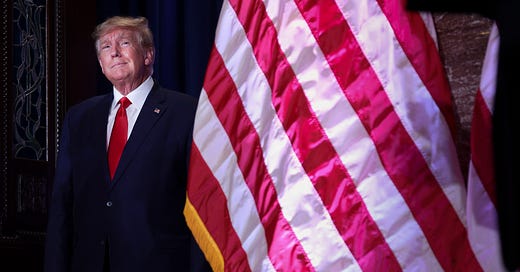Trump Is Not a “Dove”
That way of thinking and talking needs to stop right now

I’ll let you in on a little secret: No general topic consistently kills traffic online like foreign policy. That was clear when I worked at The Week, where any column focusing on international affairs (outside of brief news cycles after a major event) would languish, passed over in the competition for clicks in favor of pieces written on almost any other topic. And it’s true for me at Substack as well, where foreign-policy-focused posts don’t travel as well on Twitter as most other posts.
I have some speculative thoughts about why this is—mostly having to do with the collective narcissism of Americans, who see everything that happens in the wider world (to the extent that they even pay attention to it at all) through the lens of our country’s own internal dramas and conflicts. But I don’t mention this because I want to make that kind of point in this post. (I made a related point in my post two days ago, in fact.) I mention it in order to emphasize that I’m publishing this post despite knowing it might not get much traction—because I think it’s important regardless of how much buzz it generates online.
Hawks and Doves
This is a post about how we in the media think and talk about Donald Trump’s campaign to recapture the White House. A recent article in Politico gave us a good example of how not to proceed. Its title, which distills and exemplifies the problem, is this: “Trump’s ’24 Game Plan: Be the Dove Among the Hawks.”
The piece, which is well reported and written, makes a compelling case. It runs like this: The Republican default on foreign policy over the past two decades has been neoconservative hawkishness. Trump tried to break from this during his single term in office, but he was often thwarted by advisers and career civil servants at the Pentagon and elsewhere in the federal bureaucracy who opposed the shift. Joe Biden’s muscular response to Russia’s invasion of Ukraine seems to have strengthened the hawks. But the Republican base is souring on the cost, duration, and risks of supplying Ukraine (directly and indirectly through NATO) with aid and weapons to resist the will of Russian President Vladimir Putin.
That opens a space for Trump to revert to and even double down on his “dovish” position. With a series of extremely hawkish candidates from Trump’s own administration—former UN ambassador Nikki Haley, former secretary of state Mike Pompeo, and former national security advisor John Bolton—preparing to jump into the race, Trump can differentiate himself from his rivals by staking out an alternative position that appeals to a growing war-weary segment of the Republican electorate.
My objection to this story has to do with the use of the term “dove” to describe Trump’s position, implying he’s some kind of peacenik in comparison with the “hawkish” warmongers on the other side. That is at best misleading and at worst an outrightly dishonest way to think and talk about Trump’s stance toward the world. And the alternative favored by some foreign policy “realists”—saying Trump favors “restraint”—is little better
Trumpian Transactionalism
It is certainly true that Trump, like Biden, favored American withdrawal from Afghanistan. (I did, too.) Viewed in isolation, that could make it sound like Trump was and is a dove. But just as Biden combined support for extricating the United States from Afghanistan with a forceful defense of Ukraine from Russian aggression, so Trump blended a desire to pull American forces out of South Asia with combativeness toward other countries.
Recall his record: Trump scuttled the nuclear deal the Obama administration brokered with Iran and ordered the assassination of Qassem Soleimani, head of Iran's Revolutionary Guards Quds Force. He also threatened Venezuela with military force, vowed to rain down “fire and fury” on North Korea (before beginning a lovefest with its Supreme Leader Kim Jong-un), and took a hard line toward China (which Biden has expanded on), a mixed line toward Russia (with Trump’s personal and inexplicable personal fondness of Putin combined with his administration’s tough stance on sanctions), a warm approach to both Israel and Saudi Arabia, and a cold approach toward the European Union and NATO.
That’s quite a mixed bag and hardly fits with viewing Trump as a dove who favors restraint as a general principle. It’s more accurate to say it shows Trump was (and probably remains) an amoral unilateralist and transactionalist. That is, he disdains alliances and their obligations; he favors maximal flexibility for himself and the United States; he believes in the U.S. acting in accordance with its interests (as opposed to moral imperatives); and he defines those interests extremely narrowly—oftentimes so narrowly that they overlap completely in Trump’s mind with his own personal pursuit of profit as a businessman with financial interests around the world.
Certainly nothing in any of this shows Trump would be disinclined to use military force to achieve whatever goals he sets out to pursue. We can just know the alliance system, the relative strength or weakness of democracy or authoritarianism in various countries and regions, and the fate of human rights around the world won’t enter into his calculations.
Keep reading with a 7-day free trial
Subscribe to Notes from the Middleground to keep reading this post and get 7 days of free access to the full post archives.




